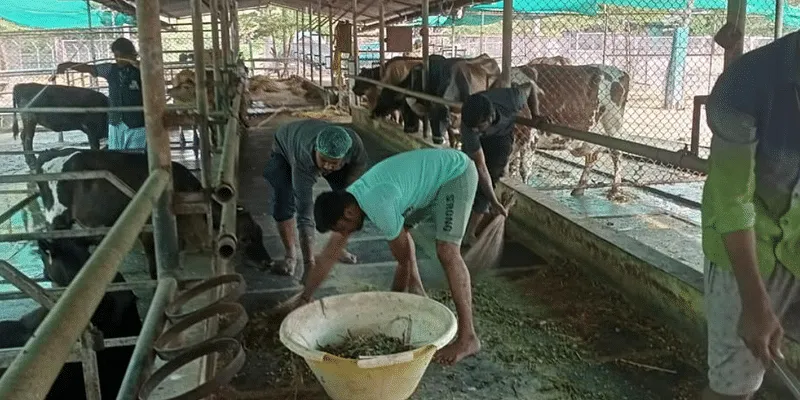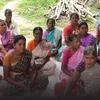To make agriculture viable for farmers, Akshayakalpa Organic turns to sustainability
Akshayakalpa Organic intends to foster sustainable entrepreneurship in Indian agriculture while enabling income generation for farmers.
With 42.6% of India’s workforce employed in agriculture, farming plays a vital role in the country’s economy. However, many young farmers are moving away from the industry. According to Input Survey 2011-12, the average age of an Indian farmer was 50.1 years.
The agrarian economy is in a state of decline due to several reasons—high risk of market and environmental shocks, uncertainty about the weather, low profit and inadequate income, small land holdings and low production, labour shortage, and urban migration, among others.
Enter Bengaluru-based Akshayakalpa Organic, which is working to reverse this phenomenon and make agriculture a viable occupation through its farmer entrepreneurship projects.
Founded in 2010 by Shashi Kumar, Akshayakalpa Organic is an APEDA (Agricultural and Processed Food Product Export Development Authority) certified organic dairy enterprise that offers milk and milk-based products free from antibiotics, synthetic additives, and chemical pesticide residue.

Shashi Kumar, Founder and CEO of Akshayakalpa Organic
Creating a healthy economy
Akshayakalpa, which means "endless possibilities" in Hindi, is working to expand access to nutrition derived from a hygienic and sustainable farming ecosystem.
“When we decided to focus on organic farming, we started with dairy because it gives farmers a regular cash flow. Additionally, dung is an output in dairy and it can be used to make the soil fertile and sustainable,” says Shashi Kumar, CEO and Founder of Akshayakalpa Organic, in a conversation with SocialStory.
At present, the team of about 500 employees has also started beekeeping, in addition to poultry farming.
Shashi adds that all of Akshayakalpa’s farmer training programmes are designed to assist them in generating a reliable and sufficient income stream. The team identifies farmers and equips them with academic, financial, technological, and mechanical resources they need to prioritise the quality of milk and the well-being of the cattle.
In return, it asks farmers and their families to follow a stringent set of rules such as observing a no-alcohol policy as well as passing sanitary and quality assessments.
The organisation settles farmer payments on a daily basis, giving them a fixed source of daily income. The primary goal of the initiative is to increase farmer wealth.
“On average, a farmer earns Rs 1 lakh per month, bringing aspiration back to the farming vocation. Even after all the deductions, they can get around Rs 50,000 in hand,” he adds.

A corn farmer under Akshayakalpa's farmer training programme
Helping farmers
While Akshayakalpa puts in place concrete measures to make farming practices sustainable and economical, it also throws light on the moral aspects of farming. It nurtures farmers to value the soil and the role of the livestock, ensure the quality of products, and recognise customer satisfaction.
“Our fundamental philosophy is that there needs to be a consumer paying for any value of an agricultural commodity that gets created in the farm by the farmer. Only then there will be a synergy between farmers and consumers,” Shashi explains.
“Right now, a farmer doesn’t know what the consumer wants and vice versa. We, at Akshayakalpa, bring them together. We help farmers produce better quality products that the consumers are willing to pay for. Meanwhile, we ask consumers to pay a little higher so that the farmer can be compensated to give products of better quality,” he adds.
Today, Akshayakalpa claims to be the first organisation in India to test milk for antibiotics—both at the farm level and at the dairy plant. This practice is followed across the 750+ Akshayakalpa farms in Tiptur (Karnataka), Bengaluru, Chennai, and Hyderabad.
Recognising that the cows are an extension of both the organisation as well as the dairy farmer’s families, Akshayakalpa provides timely interventions and technology-driven support systems for their care, and ensures that the milking process doesn’t involve humans.

Inside the dairy farm
Sustainable culture
To promote a holistic sustainable culture, the organisation is actively involved in impact initiatives like recycling plastic, planting more trees, educating organic farming through the Akshayakalpa farm, and also encouraging women in rural India to take up backyard farming to better support their families.
Akshayakalpa’s farm practices are largely based on the principles of circular economy and co-existence farming. Simply put, it is the interdependent relationship between cow dung, soil, fodder, milk, income generated, farmer family, and farm. The brand promotes the localisation of all resources, with the organic farm meeting its own day-to-day needs.
To bring out conscious efforts and promote a sense of responsibility among commoners, Akshayakalpa Organic started a mission of collecting milk packs back from its consumers on World Earth Day (April 22) this year.
The team encourages its consumers to leave the empty milk packets at the doorstep, which are then collected by delivery persons.
As of now, Akshayakalpa Organic has recycled about 1,93,208 discarded milk and milk product packaging from its consumers. This count reflects 1,000 kg of plastic that would have otherwise gone to a landfill.
While inviting consumers to adapt to this process of returning the milk packs, the organisation gathers its employees to participate in a monthly cleanliness drive, where all members collect plastic in and around the organisation's premises—both in Tiptur and Bengaluru.
The team has plans to explore newer cities like Pune, Mumbai, and Kochi this year while consolidating its existing markets.
(The story was updated to correct a typo.)
Edited by Kanishk Singh








